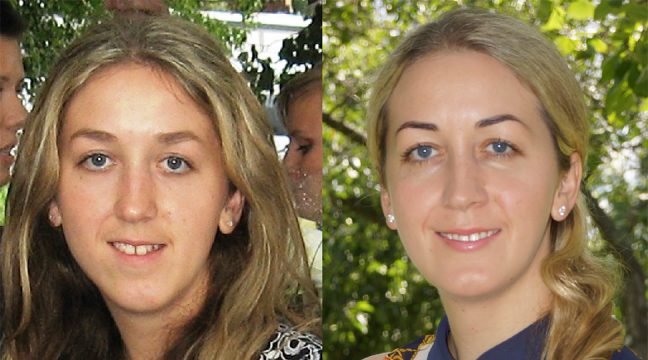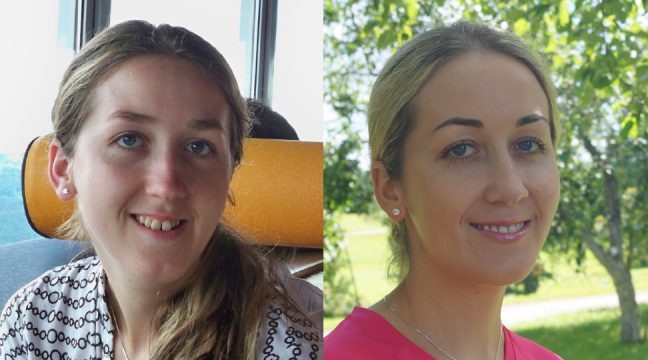Right after the surgery, when I got transferred to reanimation, I immediately noticed that I could breathe easily. I inhaled air thirstily into my lungs, and it seemed like I’m choking on it. I’ll never forget that feeling…
Jurgita, how did you learn that your occlusion (was) incorrect?
I spent my childhood in the province, where there was no doctor orthodontist. As my teeth began to change, my canine teeth grew “on top” (I looked like a vampire), so mom took me to the children’s dentist who knew the most about kid’s teeth in our area. The doctor ordered to remove the maxillary canine teeth. Back in the day, orthodontic treatment wasn’t even a part of a conversation. As years passed, approximately in the 7th grade, facial asymmetry began to develop and was accompanied by mouth breathing, childhood trauma, extracted canines, and absence of rudiment of one tooth. I had constant problems with my stomach. As I learned later, they occurred due to incompletely chewed food, barely chewed upon with a few teeth.
The longer I lived, the more I got stressed about the facial asymmetry. I can count on my fingers how many photos I have taken from school and times of studying. In 12th grade vignette, I’m photographed differently from others. Eventually, I’ve learned to pose like a professional model. I precisely knew what to do: I’d let my hair loose, stand at a different angle, and turn my head. The difference was that I, in contrast to the model’s actions, tried to conceal my features acting this way.
On the other hand, no mastery when posing helped me to avoid comments from teachers, lecturers, and employers saying that my facial expression is serious or even angry… Sarcastic comments became a problem that had to be addressed, even though I didn’t feel I deserved having such a defect or painful remarks… People who knew me well knew that I’m not like that. I realized that the problem occurred due to facial features, but I couldn’t change them on my own. So, every such remark from those around me reminded me about the defect. I used to think about it more and more frequently, I saw the crooked teeth, face, unattractive facial features, got increasingly stressed about it, and my self-confidence was growing smaller.
How did you decide to fix the occlusion?
Back then, studying in my second year, I went to see doctor orthodontist in Kaunas, who told me about the course of treatment and pricing. On the other hand, I became clear soon that I cannot choose to have treatment. The reason was simple – back then, like many other students, I was financially supported by my parents, and the amount needed for the treatment appeared to be extremely large to us. If there were any other opportunities back then, like, for instance, currently active foundation “Veido fondas”, I’d have approached it undoubtedly.
..and how did you learn that you need orthognathic treatment?
I heard about orthodontics and orthognathic treatment while studying odontology care (profession of the dental assistant). The lecturers would often present me to my groupmates as an example of malocclusion… and mentioned that in Vilnius, there is a maxillofacial surgeon Simonas Grybauskas, who performs surgeries on patients like me. After I started working after graduation, more frequently, I began thinking I should straighten my teeth. I’m delighted that after moving to Vilnius, I got acquainted with my orthodontist Evelina Margelytė-Bobinienė. During the consultation, I found out that aiming to straighten my teeth and fix facial asymmetry braces wouldn’t be enough. Orthognathic surgery will also be necessary. Back then, I knew nothing about the surgery, so I got frightened.
Did you make up our mind to have orthognathic surgery right away?
Before consultation with Simonas, after the conversation with orthodontist Evelina, I clearly realized that there are no alternatives in my case. However, suddenly a “doctor” occurred who called me silly due to my decision to have treatment with braces and have surgery, and she promised that in a year and a half, my smile would become perfect with the help of orthodontic trainers. You know what? I gave in to her influence and succumbed to the temptation. My thinking was simple: if the result can be achieved so quickly, I’ll regret later for not giving it a try.
I shared my considerations with the orthodontist, and she reacted with tolerance, didn’t try to dissuade me; however, she warned me immediately that proper results cannot be achieved by using this method. The orthodontic trainer is simply not capable of correcting facial asymmetry. Well, if the doctor had promised it would work out fine, then the patient can surely try it…
Then it all began… In the beginning, the “doctor” of orthodontic trainers manufactured a plate that was supposed to expand the maxilla. I wore the plate dutifully, turned the screw thoroughly, the way I was told to do. Gradually, my front teeth began “spreading” even more, and the poor-quality plate rubbed my gums harder and harder until ultimately, approximately after 4-5 months, it only broke unable to bear the force. Then, the doctor gave me another miraculous device, which was indeed supposed to put all teeth in place and straighten the face. I suffered for two more years. The doctor kept saying that dental arches are straightening just fine, but I saw nothing like it, I only saw even more crooked teeth and gingival recession occurring.
Now I regret even having a conversation about it, and I’ve lost the entire year. I’m grateful to orthodontist Evelina that she, after my doubting and running around, agreed to treat me!
Did you lookup for the experiences of other people when deciding to have treatment?
After consultation with my orthodontist, I got into reading at www.orthognathic.lt, but that wasn’t enough for me… Probably I watched all subject-related videos on YouTube, looked for information on the Internet in different languages… The was a shortage of information in Lithuanian language about people who chose to have orthognathic treatment, their stories, and experiences shared.
How important was the support of your loved ones and friends?
Surely, I wished to be supported by everyone, but nothing of sorts happened… Those around me instead thought I’d gone nuts, if I, at my own will, want to have my jaws cut… The most significant support came from orthodontist Evelina Margelytė-Bobinienė. She was the only one who understood what awaits me, and she was the only one to comfort me. Also, my boyfriend and my family supported me, and they always stood by me.
What are your memories of the treatment process? What moments were the hardest? The most comforting?
The treatment process got a bit prolonged, but I think everything went smoothly, and according to a plan. I felt very anxious before the surgery, but the anxiety evaporated when I arrived at the hospital when the long-anticipated day arrived. I’ll never forget that feeling when I was transferred from the reanimation department to the ward. Back then, I wanted to brag about it to everybody! I was so happy that I immediately started calling everyone on the phone, and rejoice that everything went successfully. I took pictures on the very first day after the surgery, even though I would’ve never done this before.
I felt great, except I felt immensely hungry. Before the surgery, I’ve been already planning how I’ll feed myself with broth, porridges, and yogurts, how my weight will drop, but none of this happened! I don’t understand how it is possible to lose weight after the surgery… I’ve never had any complaints regarding my appetite, so even if my weight dropped, it dropped by a kilogram if at all.
I felt the biggest comfort when visiting Simonas with my models, I’d hear him saying optimistically, “it’ll take just a little bit more” and the orthodontist Evelina consoled me by telling me not to get too dreamy about it, and reminded that the desired change of 1,5 or 2 mm might take a while.
The hardest part was that there was no single day without others asking: “So when they’ll take of your braces?” Lately, I just joked by retorting that I’m being paid to wear braces.
Ultimately, braces and orthognathic surgery became a part of my life. I used to celebrate the anniversary of the braces worn. Even my thesis was related to orthodontics. As I recall it now, it amuses me: I’m defending my thesis about the maintenance of braces just a while after the surgery, wearing braces myself, my teeth are “decorated,” my face looks a bit swelled up, my speech is inarticulate, but I felt like the happiest person in the entire world!
What would you tell patients who are currently only considering the possibility of choosing orthognathic treatment?
When deciding or choosing orthognathic treatment, it’s essential to ignore the opinion imposed by others or their attempts to dissuade you from having the surgery. One has surgery performed for himself or herself, not for others. It is also essential to understand that orthognathic surgery is a long and complicated process; therefore, it will require immense patience, tolerance, endless understanding, and humanity. The patient must unconditionally trust his/her orthodontist, surgeon because they are experts in their respective fields.
When have you felt that your life had changed indeed?
After the surgery, my life changed radically. I had no wish to recover at home alone, so I often invited friends and relatives to visit me. I think the best proof that I felt good is that when I went with a friend of mine to have a cup of coffee, I ultimately ordered a pile of food as I completely forgot that my teeth are still fitted with braces, and I’m not yet allowed to chew. Right after the surgery, when I got transferred to reanimation, I immediately noticed that I could breathe easily. I inhaled air thirstily into my lungs, and it seemed like I’m choking on it. I’ll never forget that feeling. Now I feel great and feel very happy. I can easily bite into food, chew, and stomach pain is gone, I sleep well, my smile is amazing, my teeth are straight, and so is my face. I’m learning to smile more often (I’ve lost this ability throughout the years), I feel self-confident, people give me compliments… what else is there to want?
If you could turn back time, already knowing and experiencing that, and as much as now, would you still choose to have orthognathic treatment?
Surely, yes! I wouldn’t doubt it. I’d install braces and lay down on the surgeon’s table to have surgery performed even today!
—
Orthognathic treatment always includes the joint work of doctor orthodontist and surgeon’s team. The team of Dr. Simonas Grybauskas would like to express gratitude to orthodontist Evelina Margelytė-Bobinienė for collaboration. Such treatment results were accomplished by courtesy of her.





